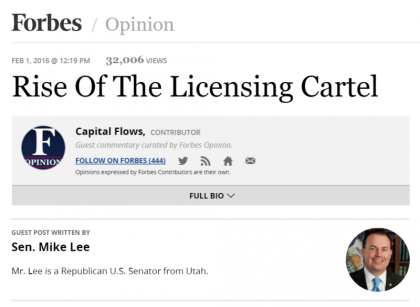End Licensing Barrier to Better Practitioners
States should enact Safe Harbors & Competitive Certification

After growing from 1 in 20 workers in 1950 to almost 1 in 3 workers today, the proportion of occupations requiring licenses today is suffocating. In 2015, even Barack Obama proposed State repeal of licensing barriers that “keep people from doing the jobs they have the skills to do by putting in place unnecessary training and high fees.”
Action: Scroll to the bottom to input a zip code, to email your state politicians.*
It’s not just the expense of licensing that bars entry into occupations, but licensing laws themselves endanger the public by their very existence. During the COVID-19 “pandemic,” for example, State licensing boards persecuted doctors who prescribed treatments that were safe and effective but not approved by pharma-influenced, government gatekeepers. Even well-intended licensing can prove inferior to alternative methods of assessing occupational quality – such as certification. Because licensing can bar work, endanger consumers, and fail to live up to the quality of alternative quality measures, the National Health Federation calls on all 50 States to reform or repeal their licensing laws.
Unleashing businesses from licensing restrictions would give consumers more choices (and jobs) in the market – with new forms of protection arising to replace any repealed government licensing rules. Everyone knew this fifty years ago, when only 5 percent of occupations required a license to practice them. Milton Friedman hailed this lack of licensure as one of the reasons for the rise of liberty in the Western World.
Repealing licensing laws is most important in health care. In his 1962 classic Capitalism and Freedom, Friedman wrote that licensing acts in reality only as a cartel measure for incumbent businesses to bar entry from “persons who might otherwise challenge the practices and pricing arrangements of the current practitioners.”
With the University of Oxford reporting only 6% of mainstream prescriptions were FDA-approved via high-quality evidence, and this same mainstream medical system having failed to stem the explosion in chronic disease to now over half of the American population, we need unlicensed but otherwise qualified experts to “challenge the practices” of licensed but unqualified healthcare.
As for replacements for licensing, the two reforms NHF supports are safe harbors and competitive certification. Over half of the States already offer safe harbor practitioner exemption laws for natural healers who do not offer treatments within the scope of licensed medicine. The other States should offer this solution too. Natural health care can reverse 80% of chronic disease, and licensing should not be used by incumbents to smother this critical market. Moreover, mainstream doctors who avail themselves of the natural-treatment, safe harbor laws should not risk the loss of their licenses either.
A more powerful solution for medical freedom – that would free all currently licensed occupations as well – stems from Competitive Certification. First proposed as a bill in Arizona, and then in 2022 in Oklahoma, this would allow a professional in any occupation to escape licensing requirements by following the qualification criteria of any registered organization that follows certain guidelines focused on market transparency. Under this new proposed law, the State would be strictly limited to prosecuting fraudulent claims of compliance with such criteria.
With Competitive Certification in place, certifying organizations could recruit professionals in any trade, market their brand for picky consumers, and enjoy the help of the State in weeding out criminals who fraudulently misuse their certification credentials. This latter solution, ultimately, will raise the quality of each market, as buyers and consumers find each other around solid, quality criteria. Licensing, in this new system, would disappear as duplicative, inefficient, and inferior means for protecting consumers. This proposal also would prevent self-interested organizations from monopolizing regulation in a State, thus protecting free competition and therefore better service.
Neither of the above reforms are mutually exclusive. Those offering services below the threshold for licensing would enjoy a safe harbor to offer their goods or services (like naturopaths). Those seeking to offer a wider array of integrated healings could have an expanded scope of practice without losing their license. And certifying organizations could enter a State to free producers from licensure and help consumers access higher quality services.
With 30 percent of markets now prohibiting new entrepreneur ventures without adhering to costly, complex government “red tape,” even the Obama Administration conceded the mistake in saddling so many different trades with one-size-fits-all licensing. The stories are legion about licensing boards failing to discipline bad actors while at the same time bullying maverick operators who are wildly popular with their customers or patients but run afoul of the political biases of their licensing board. As a cartel, licensing boards restrict supply and drive up costs. This project depoliticizes markets, enabling more vibrant entrants and better choices and jobs for consumers, all while still protecting consumers without an ossified and narrow-minded licensing board calling the shots.
*If inputting a zip code below doesn't work, that means you haven't sent yet a "national" NHF campaign. Doing so is necessary to capture data in our system. For a good "national" campaign to send, try our one expanding Health Savings Accounts. It's the effort to upgrade the "demand" side of health care, just as reforming licensing seeks to expand the "supply" of health care.